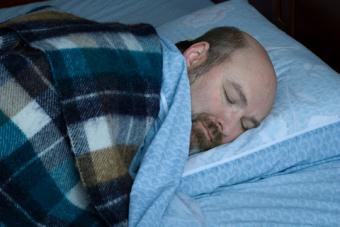
Many people experience sweating in sleep at night. This problem is not typically cause for alarm, but sweating while in bed can be uncomfortable and cause insomnia.
Reasons for Sweating in Sleep
Profuse sweating that occurs during sleep this is known as "night sweats" or sleep hyperhidrosis. This condition is very common and usually harmless, but it can also be due to an underlying medical condition that needs attention. Here are some causes for sweating at night and things you can do to prevent the problem from getting worse:
Overdressing
Many cases of night sweats might simply come from overdressing before a night of sleep, wearing improper sleepwear or having too many blankets. The sleeper's body temperature drops slightly while sleeping. This is one of the reasons why sleeping in a cool or cold room can help promote sleep and also help reduce sweating.
Warm Air
Many people find it uncomfortable to sleep in a hot room and they may wake up sweating. Doing things such as turning on a fan or air conditioner, leaving the bedroom door open to circulate air, opening a window, or sleeping alone in bed can help control the heat. Also, keep a glass of ice water or a damp towel next to the bed to help you stay cool at night.
Hot Flash
Women who are experiencing menopause complications can have hot flashes during sleep. Other problems that increase the risk of having a hot flash at night include:
- Smoking
- Being overweight
- Inactivity
Medications
Taking prescription medications can also cause night sweats to occur. Medication such as antidepressants, hormone therapy, and medicine that decreases sugar in the body can cause night sweats. Talk to your doctor if you have concerns and suspect your medication might be an issue.
Medical Issue
Night sweats are usually harmless, but a night sweat that occurs due to a medical problem is more like a severe hot flash that drenches the bed and the clothing and happens on a regular basis. Also, the body will not cool down and respond to changing the room temperate, clothing, or anything else.
A few of the conditions that could be a sign of sweating during sleep include:
- Infection
- Menopause
- Overactive thyroid
- Cancer
- HIV/AIDS
- Hodgkin's disease
- Leukemia
- Stroke
- Tuberculosis
The serious nature of these conditions makes going to a doctor imperative if you experience night sweats regularly.
Sleepwear for Night Sweats
People who experience excessive sweating in sleep should be able to control the discomfort with the proper clothing worn to bed and regulating room temperature. Purchasing moisture wicking sleepwear should diffuse the wetness so that it evaporates into the air, rather than cause you to wake up cold and wet. If specialty sleepwear does not reduce the condition, this might be a sign of a more serious problem. Here are a couple places that have sleepwear for excessive sweating while asleep.
- Harlee and Nite Sweatz have stylish thermo regulating sleepwear for women.
- Cool Jams has sleepwear for men and women.
Sweating at Night Is Common
Keep in mind that sweating in the night is very common and usually not cause for concern unless you are experiencing insomnia or suspect a deeper problem. Try regulating the temperature of the room, trying different sleepwear, and talking to your doctor if you have further concerns.







